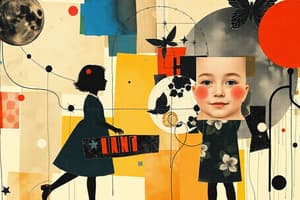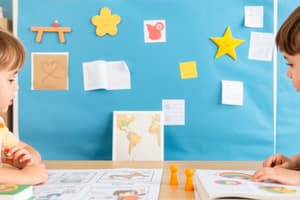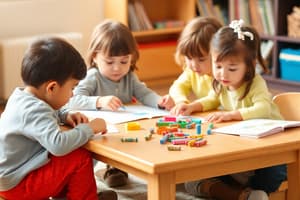Podcast
Questions and Answers
Welche Phase der Entwicklung betrifft die körperliche Entwicklung?
Welche Phase der Entwicklung betrifft die körperliche Entwicklung?
- 0-7 Jahre (correct)
- 7-14 Jahre
- 14-21 Jahre
- 21-28 Jahre
Welches Element ist für die Entwicklung der kreativen Fähigkeiten nach Steiner entscheidend?
Welches Element ist für die Entwicklung der kreativen Fähigkeiten nach Steiner entscheidend?
- Standardisierte Prüfungen
- Strenge Lehrmethoden
- Kunstzinnige Bildung (correct)
- Theoretische Wissensvermittlung
Was bildet den Kern von Steiners Sicht auf das Lernen?
Was bildet den Kern von Steiners Sicht auf das Lernen?
- Rein akademische Ausbildung
- Fokussierung auf technische Fähigkeiten
- Konkurrenzdruck unter den Schülern
- Entwicklung von Kopf, Herz und Händen (correct)
Welche Materialien werden laut Steiners Ansatz für das Lernen bevorzugt?
Welche Materialien werden laut Steiners Ansatz für das Lernen bevorzugt?
Welches Konzept ist Teil der Entwicklung über die Lebenszyklen von sieben Jahren?
Welches Konzept ist Teil der Entwicklung über die Lebenszyklen von sieben Jahren?
Welche Methode wurde von Fröbel entwickelt, um die angeborenen Eigenschaften von Kindern zu fördern?
Welche Methode wurde von Fröbel entwickelt, um die angeborenen Eigenschaften von Kindern zu fördern?
Welches dieser Prinzipien gehört nicht zu John Deweys pädagogischen Ansichten?
Welches dieser Prinzipien gehört nicht zu John Deweys pädagogischen Ansichten?
Was ist ein zentrales Merkmal der progressiven Bildung laut John Dewey?
Was ist ein zentrales Merkmal der progressiven Bildung laut John Dewey?
Wie beschreibt Dewey die Beziehung zwischen Schülern und Lehrern?
Wie beschreibt Dewey die Beziehung zwischen Schülern und Lehrern?
Was bezeichnet Dewey als 'pedagoog van participatie en democratie'?
Was bezeichnet Dewey als 'pedagoog van participatie en democratie'?
Was ist die Rolle des Lehrers in Deweys Lernansatz?
Was ist die Rolle des Lehrers in Deweys Lernansatz?
Wie beschreibt Dewey die Eigenschaften von Kindern bei ihrem Lernprozess?
Wie beschreibt Dewey die Eigenschaften von Kindern bei ihrem Lernprozess?
Welches Element gehört nicht zu Deweys offenen Rahmen-Modell?
Welches Element gehört nicht zu Deweys offenen Rahmen-Modell?
Was beschreibt am besten eine pädagogische Vision?
Was beschreibt am besten eine pädagogische Vision?
Welches Schulkonzept entstand 1820 und unterschied sich von den vorherigen?
Welches Schulkonzept entstand 1820 und unterschied sich von den vorherigen?
Was war Friedrich Fröbels Haupteinfluss im Bereich der frühkindlichen Bildung?
Was war Friedrich Fröbels Haupteinfluss im Bereich der frühkindlichen Bildung?
Was bedeutet der Begriff 'Kindergarten' im deutschen Kontext?
Was bedeutet der Begriff 'Kindergarten' im deutschen Kontext?
Welches der folgenden Elemente war KEIN Bestandteil von Fröbels Unterrichtsansatz?
Welches der folgenden Elemente war KEIN Bestandteil von Fröbels Unterrichtsansatz?
Welche Tatsache beschreibt am besten die Entwicklung von Schulen im 18. Jahrhundert?
Welche Tatsache beschreibt am besten die Entwicklung von Schulen im 18. Jahrhundert?
Welches grundlegende Konzept vermittelt die Idee, dass Kleinkinder nicht einfach kleine Erwachsene sind?
Welches grundlegende Konzept vermittelt die Idee, dass Kleinkinder nicht einfach kleine Erwachsene sind?
Was charakterisiert die Matratzen-Schulen der 1750er Jahre?
Was charakterisiert die Matratzen-Schulen der 1750er Jahre?
Flashcards
John Dewey
John Dewey
Ein revolutionärer und grundlegender Beitrag für das moderne Bildungswesen.
Progressives Lernen (Progressive Education)
Progressives Lernen (Progressive Education)
Eine pädagogische Sichtweise, die die Bedeutung des Lernens durch Handeln betont.
Pragmatismus in der Erziehung
Pragmatismus in der Erziehung
Der Fokus liegt darauf, dass Lernende die Realität so erleben, wie sie ist, und sich so an ihre Umgebung anpassen, um zu lernen.
Das ideale Klassenzimmer
Das ideale Klassenzimmer
Signup and view all the flashcards
Kinder sollen selbst erfahren (experiencing)
Kinder sollen selbst erfahren (experiencing)
Signup and view all the flashcards
Lernen durch Interesse
Lernen durch Interesse
Signup and view all the flashcards
Lehrerrolle
Lehrerrolle
Signup and view all the flashcards
Kritische Bürger
Kritische Bürger
Signup and view all the flashcards
Die Entwicklung der Kleinkindpädagogik
Die Entwicklung der Kleinkindpädagogik
Signup and view all the flashcards
Maitressenschulen
Maitressenschulen
Signup and view all the flashcards
Bewaarschulen
Bewaarschulen
Signup and view all the flashcards
Kindergarten
Kindergarten
Signup and view all the flashcards
Friedrich Fröbel
Friedrich Fröbel
Signup and view all the flashcards
Freies Spiel
Freies Spiel
Signup and view all the flashcards
Singen, Zeichnen und Malen
Singen, Zeichnen und Malen
Signup and view all the flashcards
Die Erziehung des kleinen Kindes
Die Erziehung des kleinen Kindes
Signup and view all the flashcards
Antroposophie
Antroposophie
Signup and view all the flashcards
Siebenjahreszyklen
Siebenjahreszyklen
Signup and view all the flashcards
0-7 Jahre: Die körperliche Entwicklung
0-7 Jahre: Die körperliche Entwicklung
Signup and view all the flashcards
7-14 Jahre: Das Gefühlsleben
7-14 Jahre: Das Gefühlsleben
Signup and view all the flashcards
Ruhe und Rhythmus
Ruhe und Rhythmus
Signup and view all the flashcards
Study Notes
Pedagogical Approaches Through History
-
1750 - Mattresseschools: These schools, originating from the term "maitresse," focused primarily on childcare. Conditions were often poor and unsanitary. They served a basic care function, particularly during the Industrial Revolution when both parents worked.
-
1820 - Preservation Schools: These schools differed from earlier models by having better-trained staff, and class rooms more suitable for the children. They primarily served children aged 3 to 6 years old.
-
1955 - Kindergartens: The term "kindergarten" replaced "kleuterschool" in 1955. This reflected a shift towards structured childcare and education for children, mirroring the evolution of early childhood education through different time periods.
Different Pedagogical Approaches
-
Friedrich Fröbel (early 19th Century): Fröbel is considered the "father of kindergarten education". His approach emphasized play as a central aspect of learning for young children. He believed children are naturally active and should be able to learn from free play using specifically designed "gifts" or educational play materials. His philosophy stressed that children need to be involved in creative play involving all of their senses (sight, sound, touch). This helped children explore their inherent potential and talents.
-
John Dewey (late 19th/early 20th Century): Dewey advocated for a progressive approach to education. He envisioned a hands-on learning environment as vital for young students' development. He believed learning should be practical, active, and focused on the child's interests and needs; ideally teachers should learn alongside the students. This promotes collaboration between teachers and students.
-
Rudolf Steiner (early 20th Century): Steiner, who developed anthroposophy, saw education's goal as the development of the whole child. His pedagogical ideas focused on creative expression, play, and the spiritual dimension of life. This highlights the importance of including creative activities to promote overall well-being. His educational approaches aimed to support a free exchange of knowledge across all age groups.
Development Stages (0-14 years)
-
0-7 years (physical development): Focuses on gross and fine motor skills and play, encouraging self-expression and exploration.
-
7-14 years (emotional development): Emphasizes the role of emotions in learning and the development of values and self-awareness. This is critical for exploring social competence and creativity. There is a focus on learning through creative activities, hands-on experience, and expression.
Studying That Suits You
Use AI to generate personalized quizzes and flashcards to suit your learning preferences.




